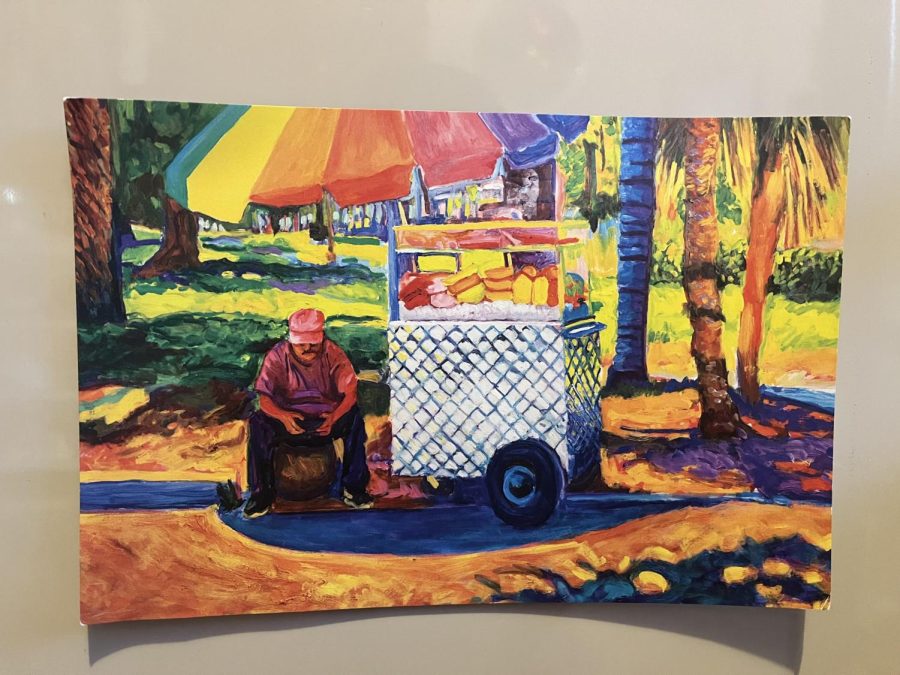Op-Ed: Why you should support street vendors
Photo credit: Lizette Gonzalez
This is a postcard of a painting depicting a street vendor by Margaret Garcia. Street vendors around Los Angeles are common sights, yet not many know about the hardships a lot of them encounter.
April 18, 2023
In Los Angeles, it’s common to see vendors stop by your car to offer you a lovely bouquet of flowers or pass by a colorful umbrella with someone rapidly cutting a plethora of delicious fruits. Street vendors are an integral part of our city.
Street vending is popular in my neighborhood. Every weekend, I go to a vendor behind my house for some tasty tacos, or if I’m in the mood for some raspados or shaved ice cream, I find myself waiting anxiously for a vendor to pass by my street.
Do you know how difficult a lot of these street vendors’ daily lives are?
There are around 10,000 street vendors in Los Angeles, but only about 240 of them have vendor permits. Although some people may think this is because food or items they sell violate health regulations, many street vendors find it challenging to obtain an authorization to begin with.
At the front of my sister’s school, there is always a large gathering of street vendors ready for the masses of children to come out. I remember how once, when I picked her up, a swarm of police officers suddenly appeared, leading many street vendors to frantically pack up and run away. It was more than distressing to witness them, who I see on a daily basis and who always hand me my raspado with a smile, run away in fear.
More recently, there has been more advocacy that brings awareness to the hardship street vendors go through. For instance, Governor Gavin Newsom passed a Senate bill titled SB 972 last September. The bill eased previous California regulations that made the process of obtaining a permit much more difficult than it should be.
The updated rules removed requirements that forced vendors to use an approved cart, pay additional fees, have four sink compartments and use other pricey equipment. Many street vendors make an average of $15,000 a year, which makes it impossible to meet these requirements. Allowing more vendors obtain permits more easily will remove one hardship from vendors that can be transformative as they support their families.
Of course this legislation is an enormous step in helping street vendors avoid legal repercussion, but vendors face another issue that will take much more advocacy.
We’ve seen the hate crimes perpetuated against vendors skyrocket in the recent years. Almost every month, a new viral video surfaces showing people break the carts of street vendors, spit on their faces or beat vendors unconscious.
Whether it was a man breaking a cart with an axe in Woodland Hills or a man threatening to call immigration officials, this behavior — behavior with racist connotations — is more than disgusting.
The criminalization of street vending is caused by the inherent racial and ethnic stereotypes. Most street vendors are Latino, do not speak fluent English, are undocumented or are members of low-income communities. These identifiers matter because these vulnerable communities struggle to integrate into the “regulated” economy because they’ve been pushed to the margins.
In my eyes, they represent a group that have beaten many odds, and despite everything against them, they are still out there, every day, working.
Not only do street vendors need greater accessibility to selling permits, but they also need basic protections. When did working hard to make a living become criminal or a threat to one’s life?
I urge readers to educate themselves more on the hardships of street vending. Working as a street vendor takes bravery; we need to stop reinforcing misconceptions such as street food being “illegal” or “dirty.”
Educate yourself by supporting bills that will protect the rights of street vendors. Follow organizations like Community Power Collective, which posts action items to support vendors. Education is power. I say this in almost every opinion piece I write, but it speaks volumes that it’s something I feel the need to repeat over and over.
Take some time to converse with vendors and learn about their stories. I recommend following Jesús Morales on Instagram who is an activist that vocalizes many issues street vendors go through and collects donations to distribute to street vendors around Los Angeles. Not only does he change so many lives, but he also humanizes their experience and lets them tell their story.
Most importantly, however, shop local.
Buy that flower bouquet or that cup of fruit; you have no idea how much that can help. You are not only supporting economically, but you’re acknowledging all the love, stress and hard work every vendor holds inside them. And that is already an immense amount of support.









